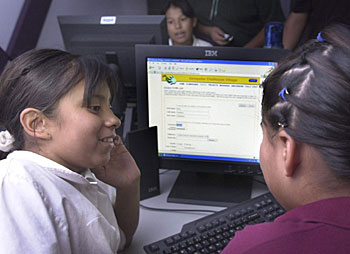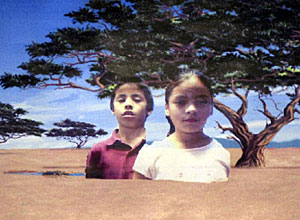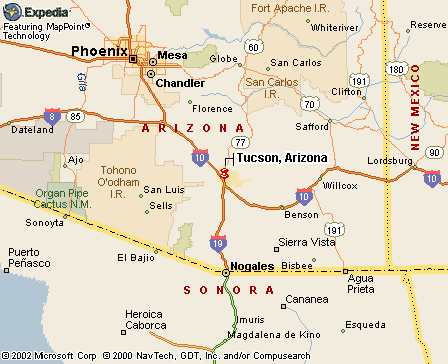|
|
Canku Ota |
|
|
(Many Paths) |
||
|
An Online Newsletter Celebrating Native America |
||
|
November 1, 2003 - Issue 99 |
||
|
|
||
|
Celebrating Their Culture, Byte by Byte |
||
|
by Joyesha Chesnick/Tucson
Citizen
|
||
|
credits: Xavier
Gallegos/Tucson Citizen, Photo #1-inside the Intel Computer Clubhouse,
Photo # 2-An example of the artwork produced by the young members
of the Intel Computer Clubhouse
|
|
The first Intel Computer Clubhouse in southern Arizona opened on the reservation this month giving children ages 10 to 18 the opportunity to learn how to use audiovisual equipment and other electronics to preserve the culture of the tribe. The Intel Computer Clubhouse Network uses technology to allow young people to explore their interests and become confident learners. The program is guided by four key principles: support learning through design; help youth build on their own interests; cultivate an "emergent community" of learners; create an environment of respect and trust, according to the nonprofit organization's Web site. "If you want to play games, you have to design them. If you want to be on the Internet, you have to design a Web page," Clubhouse assistant coordinator Felipe Flores said. Students might not realize it now, but they are learning important interpersonal and leadership skills, Flores said. One Yaqui senior, Rita Coronado, put four days of training to good use, animating a digital photograph of a Yaqui dancer and setting her work to traditional music. "It's possibly the world's first Pascua Yaqui music video," said Debora Norris, spokeswoman for the tribe. The program is open to kids - from the reservation and the larger Tucson community - after 3 p.m. at the tribe's Education and Culture Resource Center, 4747 W. Calle Vicam. "It's fabulous," Norris said. "It gives kids a new way to look at culture and make it their own." Club members work individually and in teams on short films of one another and other projects. Yaqui ninth-grader Chris Herber, the 3-D graphics expert in the lab, spends a majority of his time in the lab teaching other students how to create images in the Bryce 5 visual arts program. "I'm the only one that knows it," Chris said. Adding, that while he is still in the process of learning the computer program's intricacies, he quickly picked up the basics by his third day. "There are a lot of things you can do here. Learn new stuff, meet new people." The entire Yaqui community will be able to take advantage of the clubhouse's equipment during school hours for a project aimed at preserving the written and oral Yaqui dialect. "Very few people are fluent in the Yaqui language, so that's the priority right now," Norris said. "We haven't been able to address it up to this point through the traditional school system, so this makes the best of a bad situation." The Pascua Yaqui Intel Computer Clubhouse is one of 60 worldwide and five in Arizona. Four are in the Phoenix area, said Jeanne Forbis, spokeswoman for Intel Corp. Nancy Mager, grant administrator for the Pascua Yaqui Tribe, said the clubhouse is funded for three years by a $50,000 grant from the Bill and Melinda Gates Foundation and a $10,000 grant from Intel Corp. Various companies donated more than $300,000 worth of software and computer hardware, she said. "Intel launches the program with the idea being the tribe will make it sustainable," she said. "After three years, we'll remain in the Intel network, which provides training and support. And the kids will be part of the network through the Intel science fair and things like that." Alex Manuel, a Yaqui fifth grader, said his lucky to have the latest technology and computers available to him five days a week at the Clubhouse. "It's fun," Alex said. "I'm just trying to figure out how to do things myself." |
|
|
www.expedia.com |
|
|
||
|
|
||
| Canku Ota is a free Newsletter celebrating Native America, its traditions and accomplishments . We do not provide subscriber or visitor names to anyone. Some articles presented in Canku Ota may contain copyright material. We have received appropriate permissions for republishing any articles. Material appearing here is distributed without profit or monetary gain to those who have expressed an interest. This is in accordance with Title 17 U.S.C. Section 107. | ||
|
Canku Ota is a copyright © 2000, 2001, 2002, 2003 of Vicki Lockard and Paul Barry. |
||
 |
 |
|
|
The "Canku Ota - A Newsletter Celebrating Native America" web site and its design is the |
||
|
Copyright © 1999, 2000, 2001, 2002, 2003 of Paul C. Barry. |
||
|
All Rights Reserved. |
||
 The
legends, songs and history of the Pascua Yaqui Tribe are finding
a new high-tech life in the hands of the tribe's young people.
The
legends, songs and history of the Pascua Yaqui Tribe are finding
a new high-tech life in the hands of the tribe's young people. "They're
going to be making these videos and computer games instead of buying
them," Norris said. "It's interesting watching them watch themselves
on television, and their friends and parents. It's not something,
coming from here, that they're used to seeing. They love it."
"They're
going to be making these videos and computer games instead of buying
them," Norris said. "It's interesting watching them watch themselves
on television, and their friends and parents. It's not something,
coming from here, that they're used to seeing. They love it."